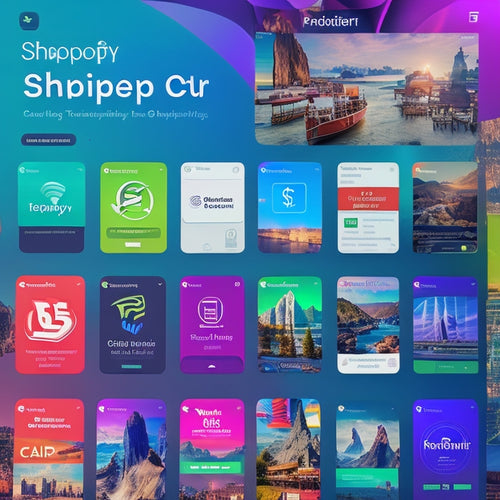
Ecommerce Merchants' Ultimate Black Week Blueprint
Share
To excel during Black Week sales, ecommerce merchants must prioritize strategic planning, technical preparedness, and data-driven insights. This means creating focused marketing strategies based on historical sales data and predictive analytics, ensuring efficient customer engagement, and distinguishing their brand through distinctive value propositions. A technical preparedness checklist is also vital, including system testing, customer support optimization, and proactive issue monitoring. By following these essential steps, merchants can access unparalleled sales growth and profitability. Now, uncover the precise blueprint to optimize your Black Week performance and establish the groundwork for long-term ecommerce success.
Key Takeaways
• Craft a data-driven marketing strategy using past sales data and predictive analytics to target high-value customers.
• Ensure technical readiness by conducting system testing, enhancing customer support, and implementing proactive monitoring.
• Differentiate your brand through strategic ad rollouts, unique value propositions, and personalized experiences to drive conversions.
• Implement a Composable Commerce strategy for adaptable platforms and prioritize customer retention for long-term growth.
• Refine your tech stack and storage categories to enhance user experience, maintain transparency, and comply with data protection regulations.
Pre-Black Week Preparation Essentials
To guarantee a successful Black Week, ecommerce merchants must prioritize thorough preparation. This involves focusing on data-driven insights, technical readiness, and strategic planning to stay ahead of the competition and capitalize on the surge in sales.
Effective customer engagement is vital, and merchants should craft targeted marketing strategies to resonate with their audience. By analyzing past sales data and leveraging predictive analytics, merchants can identify customer behavior patterns and adjust their inventory accordingly.
Strategic ad rollouts, unique value propositions, and personalized experiences will help differentiate their brand and drive conversions. By prioritizing these essential preparation steps, ecommerce merchants can ensure a profitable and stress-free Black Week.
Technical Readiness Checklist
Ecommerce merchants can further fortify their Black Week readiness by conducting a thorough technical assessment to identify and address potential system bottlenecks, ensuring seamless customer experiences and minimizing the risk of downtime during peak sales periods. This involves:
-
Conducting thorough system testing to identify and address potential bottlenecks, ensuring that all systems are functioning at their best.
-
Enhancing customer support capabilities to handle increased queries efficiently, providing timely and effective solutions to customer concerns.
-
Implementing proactive monitoring and alert systems to quickly detect and respond to any technical issues that may arise during peak sales periods.
Post-Black Week Strategies
As the Black Week frenzy subsides, forward-thinking merchants focus on refining their technical infrastructure to secure long-term sustainability and future-proofing. This involves shifting to scalable solutions, such as serverless systems, to guarantee smooth handling of peak demand.
A Composable Commerce strategy with specialized services enables adaptable platforms, ensuring sustainability and future-proofing. By implementing event-based architecture, merchants can provide real-time updates, enhancing customer satisfaction through streamlined operations.
Additionally, prioritizing customer retention is vital, as repeat customers drive long-term growth. By solidifying a scalable infrastructure and refining their tech stack, merchants can prepare for future Black Week events, ultimately driving business success.
Storage Categories and Cookies
Most ecommerce merchants understand the significance of utilizing storage classifications and cookies to enhance user experience, but few grasp the intricacies of these fundamental website components.
Effective storage classifications and cookie management are vital for consent management, allowing users to control their data and preferences. This, in turn, fosters trust and improves overall user experience.
To achieve this, merchants should:
-
Implement a clear and concise consent management system, allowing users to opt-in or opt-out of specific storage classifications
-
Guarantee essential items, necessary for basic website functionality, are always active and cannot be disabled by users
-
Provide users with granular control over storage classifications, enabling them to make informed decisions about their data and preferences
Cookie Types and Functions
Three primary types of cookies - marketing, personalization, and analytics - play an important role in enhancing user experience and informing business decisions on ecommerce websites.
Effective cookie management is vital to balance user experience with data privacy concerns. Marketing cookies deliver targeted ads, personalization cookies remember user preferences, and analytics cookies provide insights into user behavior.
To ensure data privacy, ecommerce merchants must implement consent management strategies, allowing users to opt-in or opt-out of specific cookie categories. By doing so, merchants can maintain transparency, build trust, and comply with data protection regulations.
Black Week Performance Optimization
To maximize ecommerce merchants can capitalize on the massive sales potential of Black Week, it is crucial to optimize website performance by implementing technical preparations that can withstand the surge in traffic and sales. A well-optimized website guarantees a seamless customer experience, resulting in higher conversion rates and reduced cart abandonment.
To achieve this, ecommerce merchants should:
-
Guarantee robust inventory management to prevent stockouts and overstocking
-
Optimize server capacity to handle increased traffic and sales
-
Implement caching and content delivery networks to reduce page load times and improve overall website performance
Sustainable Ecommerce Infrastructure
By adopting a scalable and adaptable infrastructure, ecommerce merchants can guarantee that their online stores remain resilient and efficient during peak sales periods like Black Week, while also reducing their environmental footprint. This approach enables sustainable growth, ensuring that businesses can thrive without compromising the planet's resources.
Eco-friendly solutions, such as cloud-based services and renewable energy sources, can significantly reduce carbon emissions. In addition, a composable commerce strategy allows merchants to select specialized services that align with their values and reduce waste.
Frequently Asked Questions
What Is the Ideal Time to Start Black Week Promotions?
When crafting Black Week promotions, ideal timing hinges on marketing strategies, sales projections, and customer engagement. Analyze competitor strategies 4-6 weeks prior to launch, adjusting your approach to maximize impact and drive conversions.
How Do I Handle Returns and Exchanges During Black Week?
Did you know that 30% of Black Week sales are returned or exchanged? To navigate this challenge, focus on handling logistics efficiently by streamlining return processes and managing expectations through clear communication, ensuring a seamless customer experience.
Can I Use Black Week to Clear Out Old or Discontinued Inventory?
To effectively clear out old or discontinued inventory during Black Week, leverage inventory management strategies by hosting clearance sales, incorporating targeted marketing strategies, and promoting discontinued products to drive sales and optimize warehouse space.
What Is the Best Way to Communicate With Customers During Black Week?
To effectively communicate with customers during Black Week, leverage customer engagement through social media and email marketing, sending personalized messages that create a sense of urgency, promote exclusive deals, and provide real-time updates to drive conversions.
How Do I Measure the Success of My Black Week Sales Event?
As the Black Week frenzy subsides, gauge success by juxtaposing the chaos of overflowing carts with the calm of satisfied customers, measuring conversion rates and customer satisfaction through metrics like order value, return rates, and Net Promoter Score.
Related Posts
-
The Rise Of Shoppable Video: Transforming Ecommerce
Shoppable video is revolutionizing the world of ecommerce, providing an immersive and inspiring shopping experience. ...
-

How Do I Add Product Recommendations on Shopify
The integration of product recommendations on the Shopify platform has gained significant attention due to its poten...
-

Unlocking Revenue Potential: Join the Shopify App Store Revenue Share Plan
The Shopify App Store has implemented a new revenue share plan for its partners, aimed at unlocking their revenue po...

